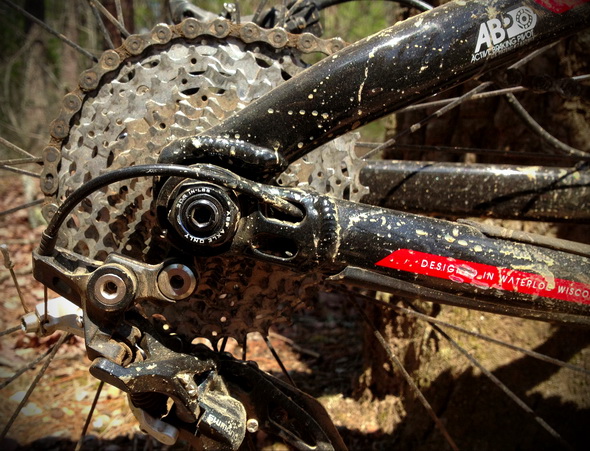I’ve been shopping around for a good bike to race the Cohutta 100 on. At first, I was hoping to find a carbon hardtail 29er to use for my race bike, but based on Jeff’s recommendation, I also threw some short-travel 29er FS XC rigs into the mix. When the opportunity came to do a long-term review of the 2013 Trek Superfly 100 AL Pro, I knew I had found my race bike!
Note: The grips, stem, front tire, and seat post in all of the photos in this article are not stock.
Specs
The Superfly 100 is an unabashedly cross-country race bike. Still, with 100mm of suspension and big 29er wheels, I have confidence this bike can tackle some pretty rowdy terrain as well. I’m looking forward to putting it to the test… but for now, we’ll just stick to the specs.

The frame is “Alpha Platinum Aluminum,” save for a carbon swingarm. The tapered headtube, while a great touch, is now pretty standard across mid- to high-end mountain bikes. However, the rear 142x12mm through axle is a feature definitely worth mentioning. While rear through axles continue to grow in popularity, you still can’t count on every frame featuring a rear QR through axle.
As I mentioned, the Superfly 100 features 100mm of suspension travel up front, and it actually sports about 110mm of travel in the rear, according to Trek’s website. Suspension duties are handled by a Fox Evolution Series 32 Float fork with a tapered steerer and a 15QR through axle and a Fox Performance Series Float rear shock, both of which are CTD (Climb, Trail, Descend) equipped. CTD is Fox’s relatively new take on suspension control, featuring three idiot-proof settings that correspond to what you’re doing on the trail. I can authoritatively confirm the idiot-proofness, having tested it myself. There’s no remote electronic control on the Superfly yet: it still has good ‘ole fashioned switches to flip.

The drivetrain is the proven, unquestionably-excellent 2×10 Shimano XT. There isn’t much more to say about XT: it’s one of the best drivetrains out there, with rock-solid shifting time after time and excellent durability. I would have preferred Shimano’s Shadow Plus clutch-style XT rear derailleur for extra protection against chain slap and dropped chains, but since this is billed as a cross country bike I can see why they might have decided not to include it. Still, in my opinion, a clutched rear derailleur can benefit riders of all disciplines.
The brakes are library-quiet, uber-powerful Shimano XTs. Known for superb modulation and excellent power with no audible protest, I have yet to find a single complaint about the XT brakes.
The stock wheels are Bontrager Race Lite Tubeless Ready Discs with, as mentioned above, QR through axles front and back. The wheels are shod with Bontrager 29-1 Team Issue 29×2.2″ tires. After only one ride (granted, it was a 63 mile singletrack ride), the front Bontrager tire had already deformed and exhibited a serious wobble. The front wheel is running straight, however, so I just swapped out the tire with a WTB. The rear wheel/tire combo is a different story: that first ride put a pretty noticeable wobble in the wheel itself. It’s not serious enough to cause the tire to rub in the stays, so I’m just going to keep riding it as-is.
This far into the review, I’d have to say that while the component spec on the Superfly is very solid, the wheels and tires leave something to be desired. Still, there are sacrifices to be made with lightweight XC wheels on a sub-$4,000 bike. A more durable set of wheels would be a nice upgrade, but would definitely add more ca-ching to the $3,899.99 suggested retail price.
Speaking of price points, the AL Pro is just one of six versions of the full-suspension Superfly 100. Trek lists all the versions on their website if you’re interested in perusing them in more detail. In short, they offer two more affordable aluminum options, bottoming out at $2,259.99, a carbon version of the frame at the same price point, and two more expensive carbon versions that top out at $9,029.99.
Stay Tuned
As the Superfly’s headcap reminds me every time I clip in for a ride, “All work and no play is no fun at all.” I’ll be sure to spend plenty of time playing on this bike before delivering my final review!
Click here to read the final review of the Trek Superfly 100 AL Pro.
Many thanks to Trek for providing the Superfly 100 AL Pro for review.
























